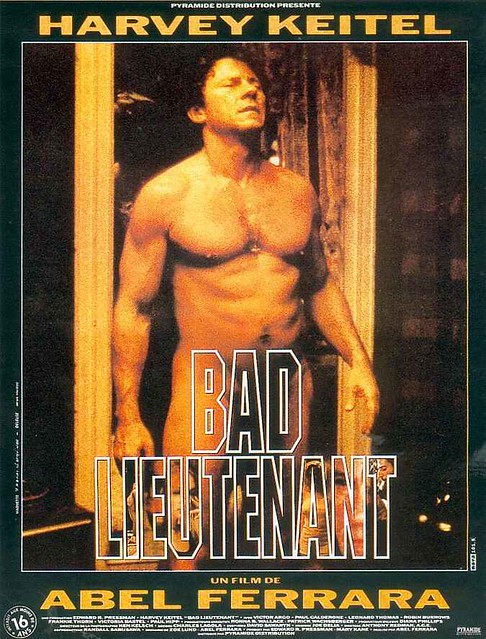
This was interesting to watch immediately after the Herzog film. For one, I think there's a little more remake going on that they admit. Although the primary crime and the third act are definitely different, and the central themes are clearly more spiritual in Ferrara's and more moralistic in Herzog's, the stories share an awful lot of similarities, like the sexual abuse of authority, the gambling-himself-into-a-hole subplot (and the requisite sympathetic bookie) and the twisted way the title character can't let go of his case.
As I said earlier, the new one feels like it riffs on the same themes but tells a different story. Cage's Bad Lieutenant and Keitel's Bad Lieutenant are both self-destructive, brutal monsters of men, both driven by a weird anti-hero's moral principles (almost a noir-hero's sense of right and wrong taken to telling extremes). But where Cage's character seems to be reptilian in nature, an aggressive walking id trying to stay one step ahead of the terrible wake he leaves behind him, Keitel's character's is haunted by a sickening loss of faith and a repentant respect for and guilt from his religion. I'm not sure which is simpler, but they're drastically different.
(One quick tangential note, thrown here in the middle because I had no way to connect it to the other comparisons I've made here: Nicolas Cage's slowly-deteriorating voice and body language reminded me increasingly of Woody Harrelson's Larry Flynt, in a way that I always chalked up to heavy pain-killer use distorting one's ability to speak. Nonetheless both times I was reminded of it. Here, Harvey Keitel's character reminded me a ton of his role in the other film he did in 1992: Mr. White from Reservoir Dogs. They are both mean-spirited quasi-good-guys who kill and steal and cheat but have strong moral backbones, and they both break down into sobs in almost exactly the same way. It's almost disappointing, because the two characters lose a bit of distinction when placed side by side, and both movies came out the same year, so. Yeah. Anyway. Just something I thought of, comparing the heroes of these two movies to other well-known characters.)
The end of this one, the first Bad Lieutenant, stands in contrast as well. In Port of Call Nicolas Cage's hero (McDonagh) pushes past some threshold of immorality and comes out miraculously, impossibly clean -- and ready to start the pushing all over again. In Ferrara's film, Harvey Keitel's nameless hero comes off to me as more furious at the world, daunted by its miracles, and lost when confronted with grace. He's a man who expects the savage, merciless law of the jungle to prevail, and crumples when he has to face greater powers than himself, forces of good and forgiveness. Or that's what this atheist pulled from the Catholic-heavy imagery. Maybe someone more spiritual can do more with that. In the "original," he is "redeemed" by helping the rapists escape, and then he is released from further sin by murder. In the "not-remake," if he is "redeemed" it is by discovering the cold, morality-free nature of nature, and committing enough "evils" that eventually something came up "good," and he is pointedly not released from further sin at all. In fact, it is implied he stands on the cusp of beginning again, though this is left open to interpretation.
Although both are pretty good films, story-wise there's no question which I'm a bigger fan of. Moral righteousness in the face of a Catholic ideal of guilt and baptism vs. moral ambiguity in the face of a capricious and arbitrary world? Yeah. Sorry, Mr. Ferrara. You made a great movie, and a brilliant character study, but put me on Team Herzog.

No comments:
Post a Comment